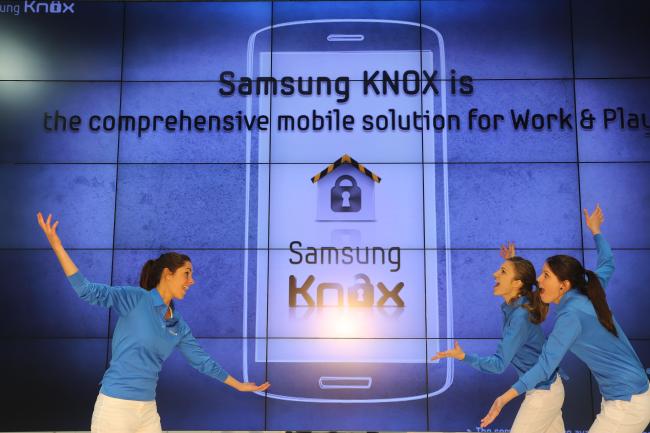Samsung Electronics will likely release next year a Tizen smartphone with its own security solution, according to a market analyst
The push for a phone running on the new operating system and using Knox, Samsung’s own security software, could increase its presence in the enterprise market.
“The ultimate goal for Samsung in developing the Android-based Knox is likely to make a smartphone embedded with Knox that runs on the Tizen OS, powered by a 64-bit chip,” said Song Jong-ho, an analyst from KDB Daewoo Securities.
Samsung has allegedly been trying to wean itself off Google’s software by leading the Tizen project with IT allies including Intel. Applying Knox to Tizen will therefore likely be the next step for Samsung to infiltrate the global smartphone market, according to Song.
Shin Jong-kyun, president of Samsung’s mobile unit, also pledged at a rare investor relations session in November that “the firm will install Knox on more smartphone models.” Knox is currently only available on Android-based smartphones.
After unveiling Knox for business customers in February, Samsung won approval from the United States Department of Defense in March to supply Knox-installed devices to the U.S. department, which is said to require one of the highest security standards in the world.
A Samsung official said the approval paved the way for adoption of Samsung Galaxy smartphones and tablets by other U.S. government agencies and industries in areas such as health care and financial services. He hinted that negotiations were underway with U.S. government organizations ― reportedly including the Federal Bureau of Investigation and the U.S. Navy ― and supply deals could be made consequently.
Subsequent deals in other global markets followed; the Korean company inked contracts to ship Knox-equipped smart gadgets to Germany, the United Kingdom and New Zealand.
Even though Samsung is aiming to strike deals with partners in various regions, the U.S. will be the core market for various reasons, according to market watchers.
“The company will focus on the American market since the world’s largest economy, home to global leading enterprises, is well aware of the importance of mobile security, and demand is quite high there,” Oh said.
On the domestic front, the Korean company is reportedly trying to secure deals with government ministries, agencies and private firms.
Among the government organizations is the Ministry of National Defense, which established its own mobile security system but stumbled due to technical glitches of the system; the mobile application did not work on iPhones, and the malfunction eventually barred military officials using the smartphones from carrying their handsets inside the headquarters in Seoul.
Samsung Electronics is also said to be in discussing with HP Korea and Heineken Korea.
“Samsung took the right path by deciding to beef up its efforts in mobile security,” said Oh Young-bo, an analyst of HanMag Securities.
“Mobile security will become more and more important for business entities and public organizations as BYOD (bring your own device) is going to become mainstream down the road,” he said.
BYOD is a trend in which firms allow staff to use their own devices to access in-house networks and applications.
According to international market research institute Strategic Analytics, around 392 million smart devices, including smartphones and tablet PCs, are expected to be shipped to enterprises this year, and 526 million units will be shipped in 2017, when the market will be worth $181 billion.
Challenges remain
Competition is not new to Samsung, but succeeding in the contested mobile security solution market, where the Korean firm is relatively inexperienced, may not be easy.
LG Electronics posed a threat to its Korean rival as it unveiled its own mobile security solution for businesses, called GATE, this year and struck deals with the four major mobile carriers in the U.S. to supply LG’s flagship smartphone G2, equipped with GATE, from October.
“The combination of the G2, which boasts the best smartphone performance, and the GATE will accelerate the BYOD trend at enterprises,” said Park Jong-seok, president of LG’s mobile communications company.
In addition, there have been recent news reports of bugs and delays in using Samsung’s Knox system on smart devices at the Pentagon, which caused a slew of complaints from military officials, and raised concerns about stability.
Samsung declined to make any comment on the technical problems.
“Since there are many software and applications for mobile security available in the global market, which maintain a strong foothold with advanced technology, Samsung may have to put more effort into stabilizing its system,” one market watcher said.
By Kim Young-won (
wone0102@heraldcorp.com)





![[Exclusive] Hyundai Mobis eyes closer ties with BYD](http://res.heraldm.com/phpwas/restmb_idxmake.php?idx=644&simg=/content/image/2024/11/25/20241125050044_0.jpg)
![[Herald Review] 'Gangnam B-Side' combines social realism with masterful suspense, performance](http://res.heraldm.com/phpwas/restmb_idxmake.php?idx=644&simg=/content/image/2024/11/25/20241125050072_0.jpg)

